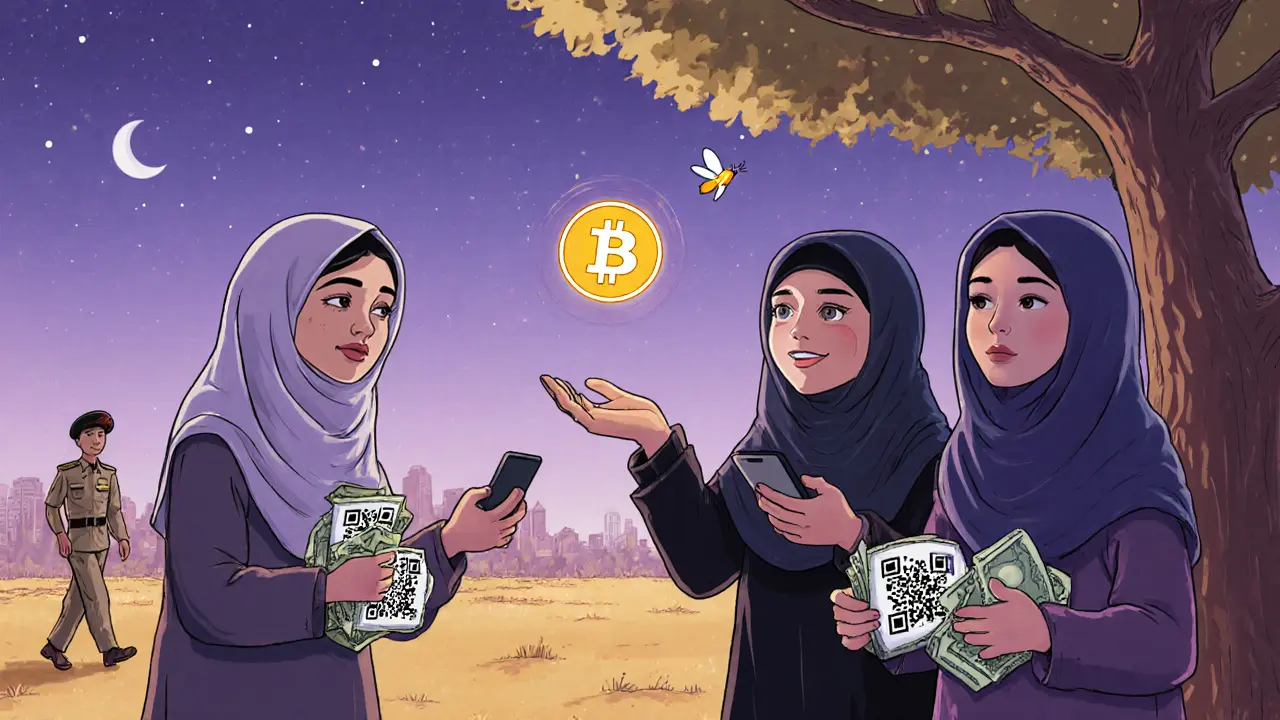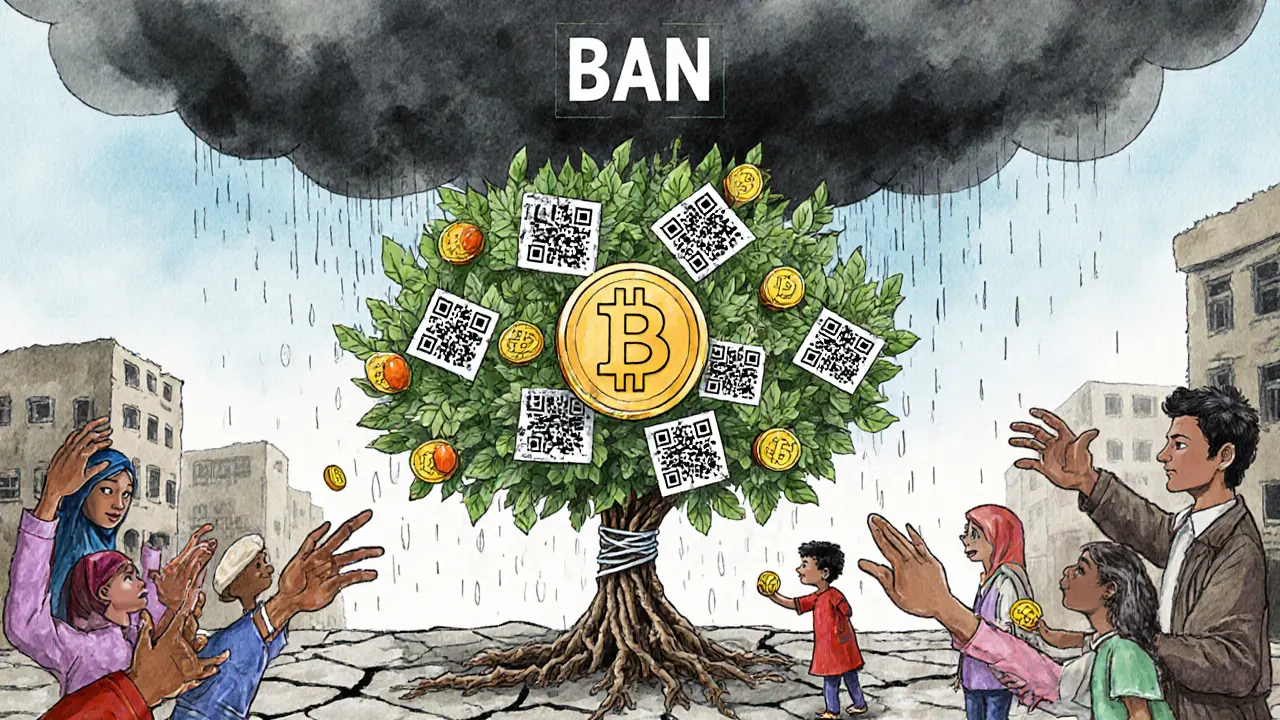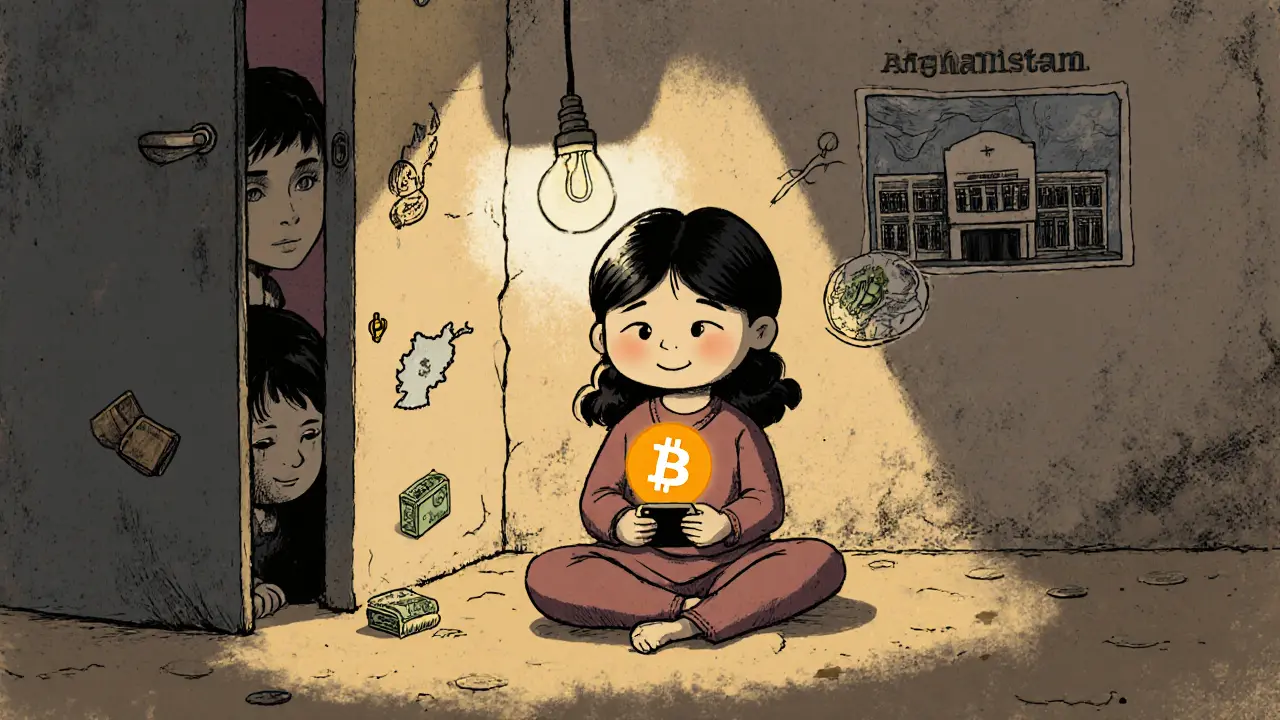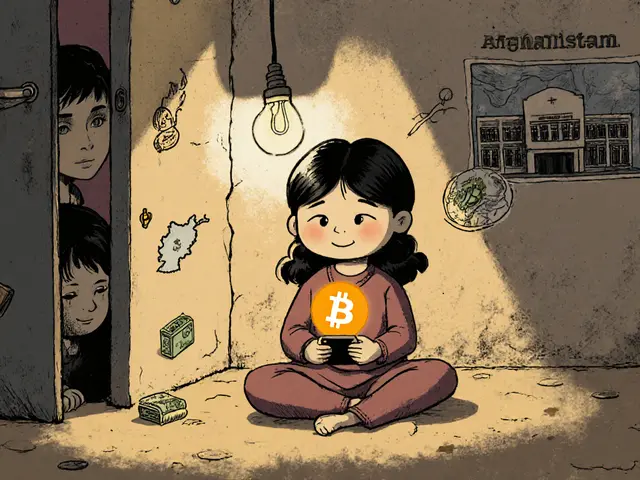Afghan Survival Cost Calculator
During Afghanistan's economic collapse, crypto became a lifeline for millions. This calculator shows the real-world impact of hyperinflation and how stablecoins maintained value when the Afghan currency failed.
Purchasing Power Comparison
At current exchange rates:
1 AFN = $0.012 USD
Afghan Currency
AFN
Could buy:
Stablecoin (USDT)
USDT
Could buy:
Why this matters: In Afghanistan's hyperinflation crisis, a 10,000 AFN payment could buy basic food for 1-2 days at the start of the crisis. By 2022, the same amount could only buy 1 meal. Stablecoins maintained value, allowing families to purchase essential goods when the local currency collapsed.
When the Taliban returned to power in August 2021, few expected Afghanistan to become one of the world’s most unexpected crypto hotspots. Within months, digital currencies like Bitcoin and USDT were being used by ordinary Afghans to buy food, send money to family, and survive economic collapse. Then, less than a year later, the government banned it all - completely. By August 2022, trading, mining, and even holding cryptocurrency became illegal under Sharia law. The ban wasn’t just a policy change. It was a shockwave that ripped through the lives of millions who had turned to crypto as their only lifeline.
Why Did Afghans Turn to Crypto in the First Place?
Before the Taliban took over, Afghanistan’s financial system was already fragile. The country had no strong banking infrastructure. Only about 20% of adults had bank accounts. When international aid dried up and foreign reserves were frozen after the government fell, the economy collapsed overnight. Salaries stopped. Prices soared. The Afghan afghani lost more than half its value in a year. That’s when people started looking for alternatives. Crypto didn’t need banks. It didn’t need ID cards. It didn’t need government approval. All you needed was a phone and internet - even if it was slow or spotty. In 2021, Afghanistan ranked 20th globally in crypto adoption, according to Chainalysis. That’s higher than Germany, France, and Japan. People used peer-to-peer apps like LocalBitcoins and Paxful to trade Bitcoin for cash. Others used USDT, a stablecoin pegged to the U.S. dollar, to protect their savings from hyperinflation. For women, crypto became even more critical. Under Taliban rule, women were banned from universities, barred from most jobs, and stripped of legal rights. Many couldn’t open bank accounts even before the takeover. But crypto? It was anonymous. It didn’t require a male guardian’s permission. A woman could receive money from abroad, store it in a wallet, and use it without anyone knowing. Roya Mahboob, a tech entrepreneur and women’s rights advocate, told human rights groups that Bitcoin gave women a sense of control - something they’d been denied for generations.The Ban: Religious Justification and Immediate Impact
On August 1, 2022, the Taliban’s Ministry of Economy issued a decree: all cryptocurrency activities were banned. The reason? It was declared haram - forbidden under Islamic law. Officials claimed crypto had no real value, was speculative like gambling, and lacked government backing. They didn’t mention the humanitarian crisis. They didn’t talk about inflation. They didn’t say a word about the millions who relied on it to feed their families. The ban was absolute. Exchanges were shut down. Miners were ordered to stop. Anyone caught trading crypto faced arrest. Within weeks, monthly crypto transactions in Afghanistan dropped from over $10 million to just $80,000. The numbers didn’t lie - the ban worked, at least on paper. But here’s the catch: people still needed money. And crypto was still the only tool that worked. So they kept trading - quietly.
Underground Crypto: The Ban That Couldn’t Stick
The Taliban can shut down exchanges. They can arrest traders. But they can’t shut down the internet. They can’t stop someone from sending a Bitcoin transaction from a hidden phone in a basement. They can’t control every WhatsApp group where people trade USDT for cash. Today, in 2025, crypto is still illegal in Afghanistan. But it’s also still alive - in the shadows. Peer-to-peer networks have become the new banking system. Traders meet in parks, in cafes, in private homes. Payments are made in cash, with QR codes scanned on phones. Bitcoin and USDT remain the most popular. Why? Because they’re the only things that hold value when the local currency is worthless. Enforcement is inconsistent. The Taliban don’t have the resources to monitor every transaction. They can’t track every wallet. And they can’t stop people from using crypto when they’re starving. A 2024 report from the United Nations found that 97% of Afghans were living below the poverty line. Food is available - but no one can afford it. Crypto fills that gap. Even high-speed internet restrictions, introduced in 2023 to limit access, haven’t stopped the flow. People use public Wi-Fi, shared phones, and even offline wallet apps that store transactions until they can connect to the network. Crypto isn’t a luxury anymore. It’s survival.A Global Outlier in a World Moving On
Afghanistan is now one of only nine countries in the world that still outright bans Bitcoin. The rest? They’ve changed course. Morocco lifted its ban in 2024. Nigeria, once hostile, now regulates crypto. Even China, which cracked down hard in 2021, now allows blockchain development and is testing its own digital currency. Afghanistan’s stance is an outlier. And it’s getting lonelier. Experts agree: global trends are moving toward regulation, not prohibition. Governments don’t want to ban crypto. They want to control it - tax it, track it, integrate it. Afghanistan is the only country still trying to erase it. The irony? The Taliban’s ban has made crypto even more valuable to ordinary people. It’s not just money. It’s autonomy. It’s privacy. It’s a way to bypass a system that refuses to help them.
The Human Cost of a Ban
Behind every transaction, every wallet, every hidden trade is a person trying to survive. A mother in Herat uses USDT to receive money from her brother in Turkey. She exchanges it for cash in a back alley. She buys flour, rice, and medicine for her children. A student in Kandahar, barred from university, uses Bitcoin to earn small freelance jobs online. She pays for internet time with cash, then sends her earnings back to her family. A woman in Kabul, unable to work legally, runs a small crypto exchange from her home. She’s not a criminal. She’s a provider. If the Taliban catch her, she could be jailed. But if she stops, her family starves. This isn’t about ideology. It’s about desperation. And no law can erase that.What Does the Future Hold?
Will the Taliban ever lift the ban? Unlikely - at least not soon. Their authority rests on control. Crypto is the opposite of control. It’s decentralized. It’s anonymous. It’s outside their reach. But the people? They’re adapting. They’re building networks. They’re teaching each other how to use wallets, how to stay safe, how to avoid detection. Women’s groups, diaspora communities, and NGOs are quietly supporting these efforts. The Human Rights Foundation and Digital Citizen Fund have trained hundreds of Afghan women in crypto basics - not as a political statement, but as a survival skill. The ban may be official. But the reality on the ground? Crypto is still running. It’s not thriving. It’s not growing. But it’s still there. And as long as the economy stays broken and the people stay hungry, it will stay. Afghanistan’s crypto story isn’t about regulation. It’s about resilience. It’s about what happens when a government tries to take away the only thing that keeps its people alive - and fails.Is cryptocurrency still illegal in Afghanistan?
Yes, cryptocurrency remains officially illegal in Afghanistan under Taliban rule. All forms of trading, mining, and usage were banned in August 2022 under Sharia law. The government considers crypto haram (forbidden) because it lacks state backing and is seen as speculative. Violators can face arrest.
Why did Afghans start using crypto in 2021?
After the Taliban takeover and the freezing of Afghanistan’s foreign reserves, the economy collapsed. Banks stopped operating, salaries went unpaid, and the national currency lost value rapidly. With no access to traditional banking, people turned to Bitcoin and USDT to buy food, send remittances, and protect savings. Crypto didn’t require ID, banks, or government approval - making it the only viable option for many.
Can women use crypto in Afghanistan today?
Yes, and many rely on it. Under Taliban rule, women are banned from most jobs, universities, and public spaces. They often can’t open bank accounts or access financial services. Crypto gives them a way to receive money from abroad, store value, and make purchases without needing permission from male relatives. Organizations like the Digital Citizen Fund have trained Afghan women in using Bitcoin as a tool for financial independence.
How are people trading crypto despite the ban?
Trading happens through underground peer-to-peer networks. People meet in person - in parks, cafes, or homes - to exchange cash for Bitcoin or USDT using mobile apps. WhatsApp and Telegram groups connect buyers and sellers. Some use offline wallet apps that store transactions until a connection is available. Enforcement is patchy, and the government lacks the resources to stop it all.
Is Afghanistan the only country that bans crypto?
No, but it’s one of only nine countries that still outright ban Bitcoin. Others include Iraq, Egypt, and China - though even some of those are shifting toward regulation. Most countries that once banned crypto, like Morocco and Nigeria, have reversed course. Afghanistan’s ban is increasingly isolated in a world moving toward digital asset integration, not prohibition.
Will the Taliban ever lift the crypto ban?
It’s very unlikely in the near future. The Taliban’s authority depends on control, and crypto operates outside their control. But as long as the economy stays broken and people depend on crypto to survive, the ban will remain unenforceable in practice. The real question isn’t whether the law will change - it’s whether the people will stop using crypto. And they won’t.


MICHELLE SANTOYO
October 29, 2025 AT 21:38So the Taliban ban crypto because it's haram... but they're fine with black market fuel and bribes? Sounds like a selective interpretation of Sharia. The real sin is starving people.
And yet here we are, watching a government criminalize survival.
Olav Hans-Ols
October 30, 2025 AT 17:29Honestly? This is one of the most human stories I've read all year. People aren't using crypto to get rich. They're using it to eat. That's not tech. That's dignity.
Kevin Johnston
November 1, 2025 AT 04:21Crypto = life support 🌱 💪
Dr. Monica Ellis-Blied
November 1, 2025 AT 21:03This is not merely an economic issue-it is a fundamental violation of human rights under the guise of religious doctrine. The Taliban's ban is a calculated act of systemic oppression, weaponizing theology to erase autonomy, particularly from women. The United Nations must intervene-not with sanctions, but with direct humanitarian crypto access protocols. This is not a technical problem. It is a moral emergency.
Herbert Ruiz
November 3, 2025 AT 02:57Chainalysis data is biased. They’re funded by crypto firms. Also, Afghanistan’s population is tiny. 20th globally? Doesn’t mean anything.
Saurav Deshpande
November 4, 2025 AT 15:40You think this is about religion? Nah. This is a CIA operation. Crypto is a Western tool to destabilize Islamic states. The Taliban are just the first line of defense. They know what’s coming-digital surveillance, biometric tracking, global financial control. This ban? It’s the only thing keeping us free.
Paul Lyman
November 6, 2025 AT 15:39People are using crypto because the world abandoned them. Not because they love tech. Because they’re desperate. And if you’re mad about that, you’ve never been hungry.
Frech Patz
November 6, 2025 AT 21:23Is there any empirical data on the rate of crypto usage among women under Taliban rule compared to pre-2021? The anecdotal evidence is compelling, but without statistical validation, it risks becoming romanticized.
Derajanique Mckinney
November 8, 2025 AT 04:26so like... they ban crypto but still let people use phones?? lmao. how does that even work?? 😅
Rosanna Gulisano
November 8, 2025 AT 07:24Crypto is gambling. God forbids it. End of story.
Sheetal Tolambe
November 10, 2025 AT 05:39It's heartbreaking but also inspiring. People finding ways to survive against all odds. Hope isn't dead in Afghanistan. It's just encrypted.
gurmukh bhambra
November 12, 2025 AT 02:38The US and EU are pushing crypto to control Afghanistan’s economy from afar. This isn’t about survival-it’s about digital colonization. The Taliban are the only ones standing in the way of global financial slavery.
Sunny Kashyap
November 12, 2025 AT 05:21Afghans are just lazy. They should’ve built banks. Now they cry because they got banned from their phone scams.
james mason
November 12, 2025 AT 15:01I mean, sure, it’s tragic. But let’s be real-crypto is a speculative asset class with zero intrinsic value. It’s not food. It’s not medicine. It’s digital glitter. The real tragedy is that people are clinging to fantasy instead of demanding real institutional reform.
Anna Mitchell
November 13, 2025 AT 19:26I didn’t know crypto could be this powerful. I thought it was just for tech bros and NFTs. This changes everything.
Pranav Shimpi
November 14, 2025 AT 02:45The real issue is infrastructure. Even if crypto is legal, most Afghans can't access it without stable internet or smartphones. The Taliban aren't the only problem-global tech inequality is. NGOs should focus on low-bandwidth wallets and offline transaction tech, not just preaching about freedom.
jummy santh
November 14, 2025 AT 05:54In Nigeria, we faced similar challenges during the 2021 banking restrictions. We didn't ban Bitcoin-we adapted. We created community nodes, used USSD codes for crypto transfers, trained women in digital literacy. Afghanistan needs the same. Not judgment. Support.
Kirsten McCallum
November 16, 2025 AT 04:54This is why people are weak. They let technology replace responsibility. If you can't trust your own currency, you deserve to starve.
Henry Gómez Lascarro
November 17, 2025 AT 18:59You people keep calling this a humanitarian crisis, but you’re ignoring the core issue: crypto is unregulated, unbacked, and fundamentally anarchic. The Taliban aren’t cruel-they’re preserving order. The real criminals are the Western crypto evangelists who flooded a war-torn nation with speculative digital nonsense and then pretended they were heroes. You didn’t save lives-you created a dependency on a volatile, illegal asset that now threatens social cohesion. The ban isn’t the problem. The entire Western crypto project in Afghanistan is.
Will Barnwell
November 19, 2025 AT 18:30Chainalysis is a crypto company. Their data is marketing. Also, ‘USDT’ isn’t even real money. It’s a token. You can’t eat a token.
Lawrence rajini
November 19, 2025 AT 18:53This is the future. Not in Silicon Valley. In basements in Kabul. Crypto isn’t about finance-it’s about freedom. And freedom doesn’t need permission. 🚀
Matt Zara
November 20, 2025 AT 21:57I’ve seen people in refugee camps use WhatsApp to send crypto. It’s not tech. It’s love. Someone’s sister in Canada sends $50 in USDT. Their mom in Herat buys rice. That’s the real blockchain.
Jean Manel
November 22, 2025 AT 08:05This is why I hate crypto. It’s a scam for people too lazy to build real systems. Now we’re romanticizing illegal underground economies as ‘resilience’? No. It’s chaos dressed up as virtue.
William P. Barrett
November 23, 2025 AT 08:26The ban reveals a deeper truth: authority fears what it cannot control. The Taliban rule through fear and visibility. Crypto is invisible. Anonymous. Decentralized. That’s why it terrifies them-not because it’s haram, but because it’s free. And freedom is the only sin they cannot forgive.
Cory Munoz
November 24, 2025 AT 10:54I just want to say thank you to the women in Kabul who are keeping this alive. You’re not criminals. You’re heroes. And I’m holding space for you, even from here.
Jasmine Neo
November 25, 2025 AT 17:33This is why crypto is a threat to sovereign states. The Taliban are right to ban it. This is financial terrorism disguised as altruism. The West weaponizes digital assets to bypass sanctions and destabilize non-aligned nations. Afghanistan is the canary in the coal mine-and you’re all cheering for the mine to collapse.
Ron Murphy
November 25, 2025 AT 20:32Interesting how the same governments that condemn crypto in Afghanistan are now developing CBDCs. The irony is thick. Control is the real goal-not prohibition or freedom.
Prateek Kumar Mondal
November 26, 2025 AT 06:22People find a way. Always. No law can stop need.
Nick Cooney
November 28, 2025 AT 02:19so the taliban ban crypto... but still let people use smartphones? lol. that’s like banning water but letting people keep bottles. 🤦♂️
Clarice Coelho Marlière Arruda
November 29, 2025 AT 10:50i had no idea crypto was this big in afghanistan. i thought it was all just crypto bros in california. this is wild. and kinda beautiful??
Herbert Ruiz
November 29, 2025 AT 14:25You’re all ignoring the real issue: the Taliban are right to ban it. Crypto has no intrinsic value. It’s not backed by gold, not backed by law, not backed by God. It’s digital fiction. And fiction doesn’t feed children.
Paul Lyman
November 30, 2025 AT 15:59If you’ve ever had to choose between feeding your kid and paying your phone bill, you’d understand why fiction is the only thing that still works.
Dr. Monica Ellis-Blied
December 1, 2025 AT 01:19You reduce human survival to a theological argument. That’s not wisdom. That’s cowardice. The Taliban didn’t ban crypto because it’s haram. They banned it because it empowers women, bypasses their control, and exposes their failure. Don’t mistake oppression for piety.
Henry Gómez Lascarro
December 1, 2025 AT 17:12And yet, the same people who call crypto ‘digital fiction’ are the ones who sold Afghanistan’s future to private military contractors and Silicon Valley venture funds. Who’s really profiting here? Not the mothers in Herat. Not the students in Kandahar. The same people who told them to use crypto are now pretending they’re victims.